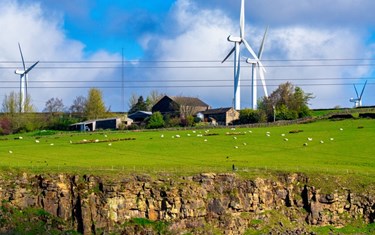In most cases we will publish your written submission on the Scottish Parliament’s website. What you send us may also be quoted in the Committee’s report or in its Committee meetings. These are public meetings that are broadcast online.
Before making a submission, please read our privacy notice (section headed Parliamentary business – Committees) about submitting your views to a Committee. This tells you about how we process your personal data. If you are under 12 years of age, please read this ‘Submitting Your Views to Committee: Young People’ section.
The Committee would particularly welcome views on the following questions–
Do the principles of sustainable development (as set out in the annexe), and those for a resilient recovery, as proposed by the UK Committee on Climate Change, provide a comprehensive framework for guiding an effective green recovery in Scotland?
Yes. There is also need to mainstream the UN Sustainable Goals.
What are the key barriers to delivering a green recovery (within your sector and / or community)?
The current situation regarding Covid-19 shows the need to change how we work so that we plan, prepare and provide a routemap for a different Scotland. There is a need to agree that we need a new normal and how we achieve this. We need to embed resilience into how our cities, towns, villages and neighbourhoods function and develop over time. This needs to embrace risk in a more positive and constructive way. To make this change RTPI Scotland is of the view that there is a need to undertake the following shifts:
- from short term thinking to long-, medium- and short- term thinking
- from having many overlapping and disjointed strategies to complementarity
- from an opportunistic, reactive approach to development to a planned, proactive approach
- from economic priorities to holistic priorities covering environmental, social and economic issues
- from a competitive investment approach to one of managed investment
- from a deal-making approach to one based on providing a place vision first
- from short-term, project focussed investment to a planned long term holistic vision
The Committee may also want to read our recent report Plan The World We Need at www.rtpi.org.uk/plantheworldweneed
What key policies, actions and immediate priorities are needed to deliver a green recovery (within your sector and / or community)?
A green recovery from COVID-19 will require a reduction in unsustainable patterns of consumption, which contributes to climate and ecological breakdown and increases the risk of future pandemics. These pressures, coupled with continued supply chain disruption and the need to decarbonise, could also impact on land use. Urban areas could see increased demand for sectors which support a circular economy, such as decentralised manufacturing and upcycling, while rural areas could see changing patterns of demand for food, timber and minerals. These changes will be coupled with the contraction of at-risk sectors, creating challenges for certain places. Proactive planning and place-leadership will be needed to maximise the opportunities of a green industrial revolution, while helping vulnerable places navigate through a difficult transition. RTPI Scotland believes that the 4th National Planning Framework (NPF) provides an opportunity to effect real, positive change towards a green recovery.
NPF4 should be accompanied by a 10 year capital investment programme with buy in from across government. It should be used as a key corporate document that influences Scottish Government decision making and has buy in from all Cabinet Secretaries in supporting their Post Covid-19 recovery ambitions and as a vision piece on planning for the ‘new normal’. IT should be seen as the spatial articulation of the Scottish Government’s National Outcomes - much as development plans are the spatial articulation of Local Outcome Improvement Plans - which clearly sets out relationships between the planning at national, regional, local and community levels. NPF4 should also embed “Place and Wellbeing” themes from Place Standard and ensure collaborative implementation of the NPF through the place principle. NPF4 should be structured around outcomes which are tied into planning authority performance assessment frameworks and priority strategic themes on achieving climate action, delivering a net zero carbon Scotland and improved health and wellbeing and it should promote active and sustainable travel. The document should ensure that the reuse first principle - where previously used land, buildings, places, materials and infrastructure are given preference to new - is applied across all of planning for places. It should adopt and embed the principle of planning decisions that provide long-term positive impacts to prevent persistent problems such as poverty, health inequalities and climate change and which meet the needs of future generations. It should include short-, medium-, and long-term milestones and establish a delivery oversight group (which should include representatives from younger generations) to report annually on progress being made.
How should the 2021/22 Budget support a green and sustainable recovery and avoid locking in carbon; and what funding is needed in the ECCLR portfolio to deliver a green and sustainable recovery?
There is a need to recognise the key role that planners, planning and planning system can play in supporting the move towards net zero carbon. This requires investment in:
- Effective leadership from elected mayors and councillors will be critical to the recovery, and should be informed by the expertise of Chief Planning Officers
- Robust strategic planning arrangements aligning infrastructure investment and other stimulus measures with the needs of businesses, and the economic, social and environmental priorities of multiple local authorities.
- Investment in proactive planning to allow for meaningful participation with local communities and close collaboration between council departments, developers, businesses and infrastructure providers.
- Resources for community participation in planning.


